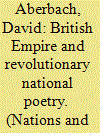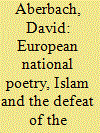|
|
|
Sort Order |
|
|
|
Items / Page
|
|
|
|
|
|
|
| Srl | Item |
| 1 |
ID:
095095


|
|
|
|
|
| Publication |
2010.
|
| Summary/Abstract |
The British empire set off an explosion of poetry, in English and native languages, particularly in India, Africa and the Middle East. This poetry - largely neglected in the scholarship on nationalism - was often revolutionary both aesthetically and politically, expressing a spirit of cultural independence. Attacks on England and the empire are common not just in native colonial poetry but also in poetry of the British isles. This article discusses some of the most influential poets, including: Shawqi of Egypt, Tagore of India, Rusafi of Iraq, Yeats of Ireland, Iqbal of Pakistan, Greenberg of pre-State Israel, and Kipling, the 'poet of empire'. In contrast with other empires, many poets were inspired by British culture to create revolutionary art and seek political independence. Most strikingly, British rule was instrumental in the revival of vernacular Hebrew poetry after 1917 as the centre of Hebrew literature shifted from Odessa to Tel Aviv.
|
|
|
|
|
|
|
|
|
|
|
|
|
|
|
|
| 2 |
ID:
082679


|
|
|
|
|
| Publication |
2008.
|
| Summary/Abstract |
From Byron's death at Missolonghi in 1824 to D'Annunzio's capture of Fiume for Italy in 1919, the nationalism of universal liberalism and independence struggles changed, in literature as in politics, to cruel dictatorial fascism. Byron was followed by a series of idealistic fighter-poets and poet-martyrs for national freedom, but international tensions culminating in World War I exposed fully the intolerant, brutal side of nationalism. D'Annunzio, like Byron, both a major poet and charismatic war leader, was a key figure in transforming nineteenth-century democratic nationalism into twentieth-century dictatorial fascism. The poet's 'lyrical dictatorship' at Fiume (1919-20) inspired Mussolini's seizure of power in 1922, with far-reaching political consequences. The poet became the dangerous example of a Nietzschean Übermensch, above common morality, predatory and morally irresponsible. This article shows how the meaning of nationalism was partly determined and transformed by poets, illustrating their role as 'unacknowledged legislators of the world'
|
|
|
|
|
|
|
|
|
|
|
|
|
|
|
|
| 3 |
ID:
115226


|
|
|
|
|
| Publication |
2012.
|
| Summary/Abstract |
The Muslim conquest of the Holy Land from Christendom, the invasion of southwestern Europe in the eighth century, and the Christian struggle, ultimately unsuccessful, to regain the Holy Land from Islam in the Crusades dominated European culture, particularly its poetry, for centuries. From the Old French epic, The Song of Roland (c. 1100) to the Albanian epic, The Highland Lute (early twentieth century), a vast popular culture grew in European vernacular languages in response to Muslim invasions and conquests. This article attempts to elucidate in panoramic form a neglected area of nationalism. It argues that from the medieval period until the fall of the Ottoman empire, poetry was instrumental in the rise of European national identities, partly in reaction to centuries of ascendancy of Islam, which undermined the authority of the Pope, the universal Church, the Gospel and Latin. The defeat of the medieval Church opened the way to narrower, more national and cultural concerns, reflected in a cluster of vernacular European poetic traditions.
|
|
|
|
|
|
|
|
|
|
|
|
|
|
|
|
|
|
|
|
|